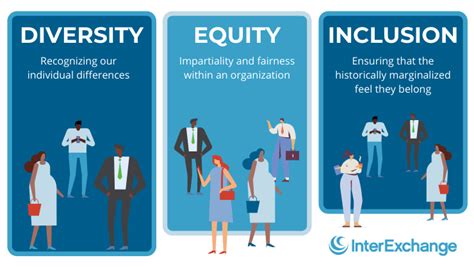What Is The Difference Between Diversity, Equity, And Inclusion?

As society becomes more diverse, terms like diversity, equity, and inclusion become more important in our daily lives, especially in the workplace. While these terms are often used interchangeably, they have distinct meanings. Understanding the differences between them is essential to creating a more equitable and inclusive society.
What Is Diversity?
Diversity is the recognition and appreciation of differences among people. It encompasses a range of identities, including but not limited to race, ethnicity, gender, sexual orientation, age, religion, and ability. Diversity means recognizing that everyone is different and unique.
What Is Equity?
Equity is the recognition that not everyone has the same opportunities or access to resources. It involves taking steps to ensure that everyone has the tools and support they need to succeed, regardless of their identity. Equity means recognizing that some people need more support than others to achieve the same outcomes.
What Is Inclusion?
Inclusion is the active engagement of all individuals, including those who have been historically excluded or marginalized. It involves creating an environment where everyone feels valued, respected, and supported. Inclusion means recognizing that everyone has something to contribute and that everyone deserves to be included.
The Relationship Between Diversity, Equity, and Inclusion
Diversity, equity, and inclusion are interrelated concepts that work together to create a more just and equitable society. Diversity is a recognition of difference, equity is a recognition of unequal access to resources and opportunities, and inclusion is a recognition of the need to actively engage all individuals. When organizations prioritize diversity, equity, and inclusion, they create a culture that values and respects all individuals, regardless of their identity.
The Benefits of Diversity, Equity, and Inclusion
Organizations that prioritize diversity, equity, and inclusion benefit in several ways:
- Increased innovation and creativity
- Improved decision-making
- Greater employee engagement and satisfaction
- Increased access to diverse talent
- Improved reputation and brand image
How to Promote Diversity, Equity, and Inclusion
Promoting diversity, equity, and inclusion requires a commitment from all individuals and organizations. Here are some steps you can take:
- Educate yourself and others about diversity, equity, and inclusion
- Examine your own biases and assumptions
- Be open to feedback and willing to learn
- Create an inclusive culture by valuing and respecting all individuals
- Ensure equitable access to resources and opportunities
- Hold yourself and others accountable for promoting diversity, equity, and inclusion
- Take action to address systemic inequalities
Frequently Asked Questions
What are some examples of diversity?
Examples of diversity include race, ethnicity, gender, sexual orientation, age, religion, disability, and socioeconomic status.
Why is equity important?
Equity is important because it ensures that everyone has access to the resources and support they need to succeed, regardless of their identity. Without equity, some individuals may be at a disadvantage due to systemic inequalities.
What is the role of inclusion in the workplace?
Inclusion is essential in the workplace because it creates an environment where everyone feels valued, respected, and supported. When employees feel included, they are more likely to be engaged, satisfied, and productive.
How can I promote diversity, equity, and inclusion in my workplace?
You can promote diversity, equity, and inclusion in your workplace by educating yourself and others, examining your own biases, creating an inclusive culture, ensuring equitable access to resources and opportunities, holding yourself and others accountable, and taking action to address systemic inequalities.
What are the benefits of a diverse and inclusive workplace?
A diverse and inclusive workplace benefits organizations by increasing innovation and creativity, improving decision-making, increasing employee engagement and satisfaction, increasing access to diverse talent, and improving reputation and brand image.
How can I hold myself accountable for promoting diversity, equity, and inclusion?
You can hold yourself accountable for promoting diversity, equity, and inclusion by setting goals, tracking your progress, seeking feedback, and being open to learning and growth.
Conclusion
Diversity, equity, and inclusion are essential concepts for creating a more just and equitable society. While these terms are often used interchangeably, they have distinct meanings. Understanding the differences between them is essential to promoting diversity, equity, and inclusion in all areas of our lives.
